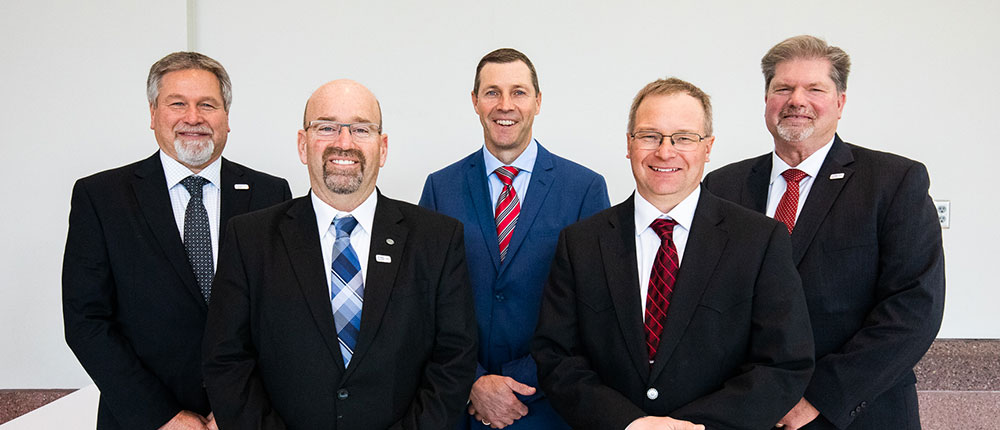
CHS owners elected five board members to three-year terms during the cooperative’s 2022 annual meeting held Dec. 1 and 2 in Minneapolis, Minn.
(more…)
Contact Us | 800-642-0046
Customer Service: agdigital@chsinc.com

CHS owners elected five board members to three-year terms during the cooperative’s 2022 annual meeting held Dec. 1 and 2 in Minneapolis, Minn.
(more…)Net Income of $1.7 Billion and Revenues of $47.8 Billion Exceed Previous Records
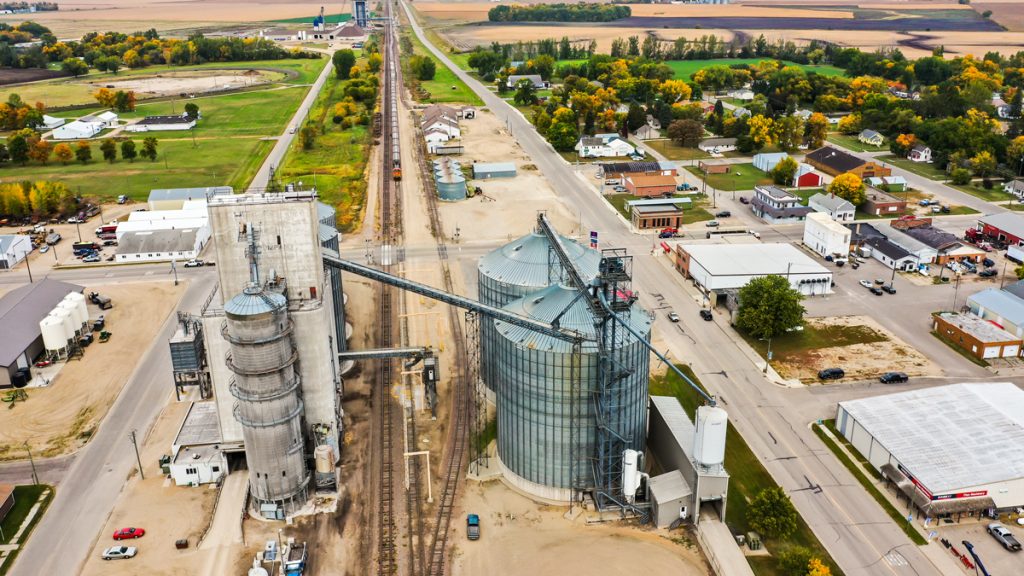
CHS Inc. reported net income of $1.7 billion for the fiscal year ended Aug. 31, 2022, compared to $554.0 million for fiscal year 2021.
Key financial drivers for fiscal year 2022 results include:
“We appreciate the support of our member cooperatives and farmer-owners, which enabled us to deliver a substantial increase in earnings for the fiscal year, while also helping feed people around the world,” said Jay Debertin, president and CEO of CHS Inc. “Additionally, our employees demonstrated their dedication to helping our owners and customers succeed in a turbulent year for agriculture. As a result of these collective efforts, CHS intends to return $1 billion in cash patronage and equity redemptions to our member cooperatives and farmer-owners in fiscal year 2023, reflecting the company’s financial strength and demonstrating the value of cooperative ownership.
“We are proud of our role in the cooperative system. We will continue to make investments that strengthen rural America and help our farmer-owners and customers meet the growing demand for agricultural products. Our investments in infrastructure, supply chain capabilities, people and innovation are driving operational and efficiency gains throughout our expansive network,” Debertin added. “Although economic uncertainty, logistical challenges and inflationary pressures remain, CHS is well-positioned to maximize value for our member cooperatives and farmer-owners.”
Fiscal year 2022 segment results are:
Pretax earnings of $616.6 million represent a $627.1 million increase versus the prior year and reflect:
Pretax earnings of $657.6 million represent a $359.5 million increase versus the prior year and reflect:
Pretax earnings of $478.0 million represent a $357.0 million increase versus the prior year and reflect:
Pretax earnings of $57.9 million represent a $48.9 million decrease versus the prior year and reflect:
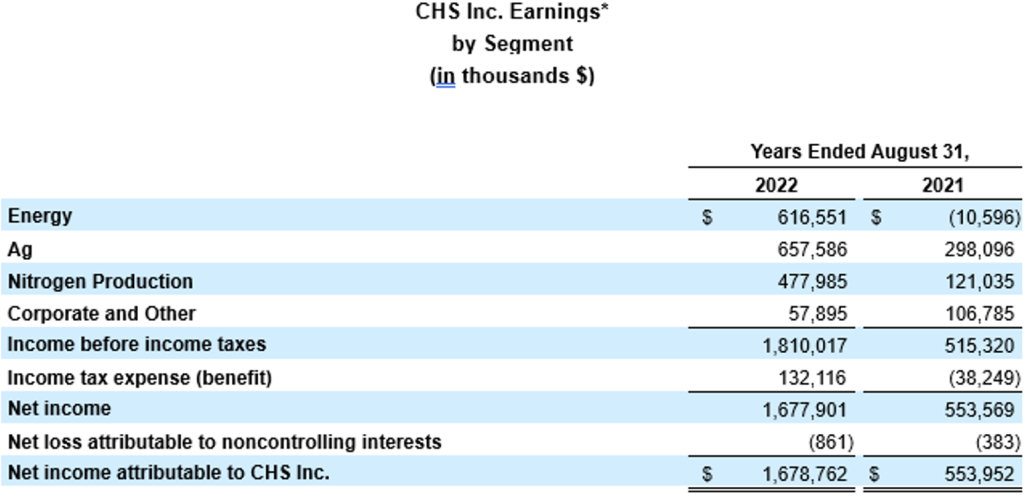
CHS Inc. (www.chsinc.com) is a leading global agribusiness owned by farmers, ranchers and cooperatives across the United States. Diversified in energy, agronomy, grains and foods, CHS is committed to creating connections to empower agriculture, helping its farmer-owners, customers and other stakeholders grow their businesses through its domestic and global operations. CHS supplies energy, crop nutrients, seed, crop protection products, grain marketing services, production and agricultural services, animal nutrition products, foods and food ingredients, and risk management services. The company operates petroleum refineries and pipelines and manufactures, markets and distributes Cenex® brand refined fuels, lubricants, propane and renewable energy products.
This document and other CHS Inc. publicly available documents contain, and CHS officers and representatives may from time to time make, “forward-looking statements” within the meaning of the safe harbor provisions of the U.S. Private Securities Litigation Reform Act of 1995. Forward-looking statements can be identified by words such as “anticipate,” “intend,” “plan,” “goal,” “seek,” “believe,” “project,” “estimate,” “expect,” “strategy,” “future,” “likely,” “may,” “should,” “will” and similar references to future periods. Forward-looking statements are neither historical facts nor assurances of future performance. Instead, they are based only on CHS current beliefs, expectations and assumptions regarding the future of its businesses, financial condition and results of operations, future plans and strategies, projections, anticipated events and trends, the economy and other future conditions. Because forward-looking statements relate to the future, they are subject to inherent uncertainties, risks and changes in circumstances that are difficult to predict and many of which are outside of CHS control. CHS actual results and financial condition may differ materially from those indicated in the forward-looking statements. Therefore, you should not place undue reliance on any of these forward-looking statements. Important factors that could cause CHS actual results and financial condition to differ materially from those indicated in the forward-looking statements are discussed or identified in CHS filings made with the U.S. Securities and Exchange Commission, including in the “Risk Factors” discussion in Item 1A of CHS Annual Report on Form 10-K for the fiscal year ended August 31, 2022. These factors may include: changes in commodity prices; the impact of government policies, mandates, regulations and trade agreements; global and regional political, economic, legal and other risks of doing business globally; the ongoing war between Russia and Ukraine; the impact of inflation; the impact of epidemics, pandemics, outbreaks of disease and other adverse public health developments, including COVID-19; the impact of market acceptance of alternatives to refined petroleum products; consolidation among our suppliers and customers; nonperformance by contractual counterparties; changes in federal income tax laws or our tax status; the impact of compliance or noncompliance with applicable laws and regulations; the impact of any governmental investigations; the impact of environmental liabilities and litigation; actual or perceived quality, safety or health risks associated with our products; the impact of seasonality; the effectiveness of our risk management strategies; business interruptions, casualty losses and supply chain issues; the impact of workforce factors; our funding needs and financing sources; financial institutions’ and other capital sources’ policies concerning energy-related businesses; uncertainty regarding the transition away from LIBOR and the replacement of LIBOR with an alternative reference rate; technological improvements that decrease the demand for our agronomy and energy products; our ability to complete, integrate and benefit from acquisitions, strategic alliances, joint ventures, divestitures and other nonordinary course-of-business events; security breaches or other disruptions to our information technology systems or assets; the impact of our environmental, social and governance practices, including failures or delays in achieving our strategies or expectations related to climate change or other environmental matters; the impairment of long-lived assets; and other factors affecting our businesses generally. Any forward-looking statements made by CHS in this document are based only on information currently available to CHS and speak only as of the date on which the statement is made. CHS undertakes no obligation to update any forward-looking statement, whether written or oral, that may be made from time to time, whether as a result of new information, future developments or otherwise except as required by applicable law.
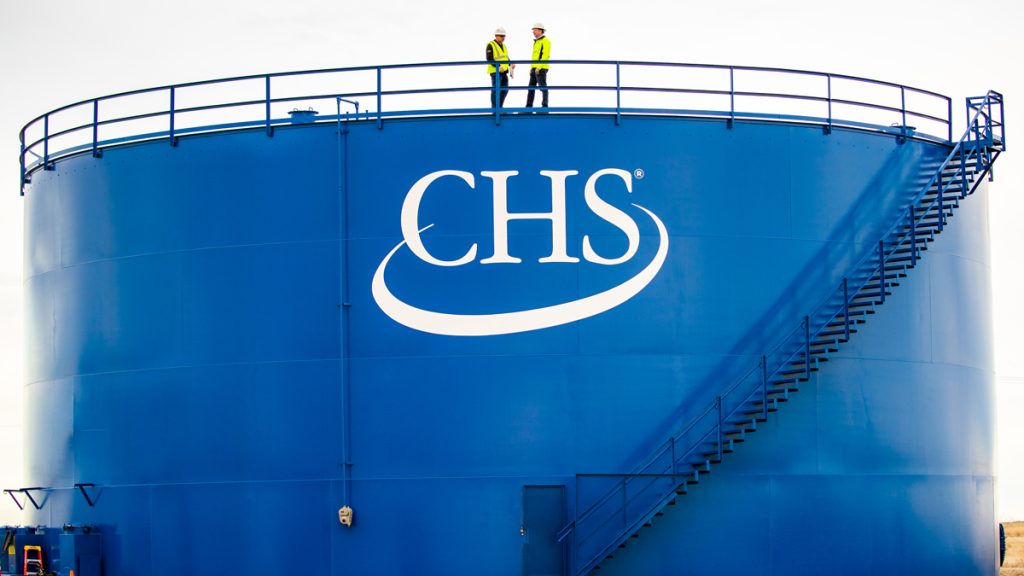
As America’s largest farmer-owned cooperative, the cooperative model and the strength it brings to local communities is the backbone of CHS. Every October, that model is celebrated as part of National Co-op Month, which aims to spread awareness about the benefits of being part of the cooperative system and the important role cooperatives play in their communities.
(more…)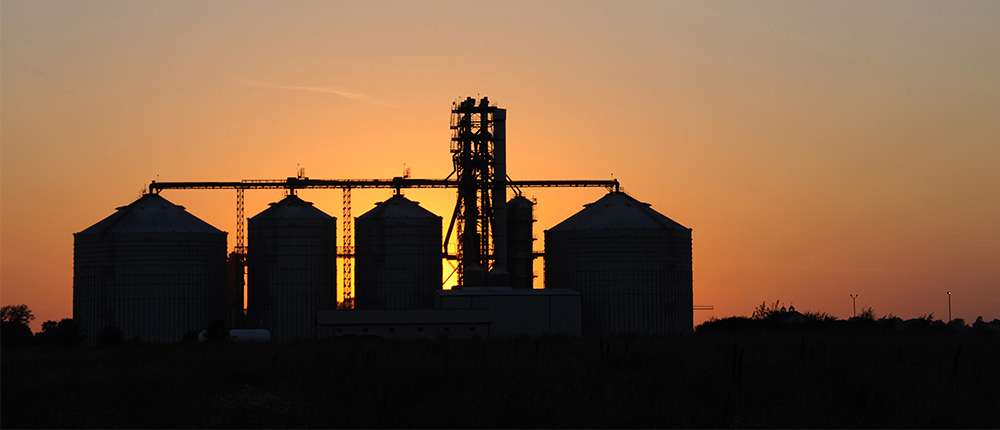
CHS Inc., the nation’s leading agribusiness cooperative, intends to return a total of $1 billion in cash patronage and equity redemptions to its owners in calendar year 2023, delivering on its objectives to share profits with owners and contribute to building strength in rural America.
(more…)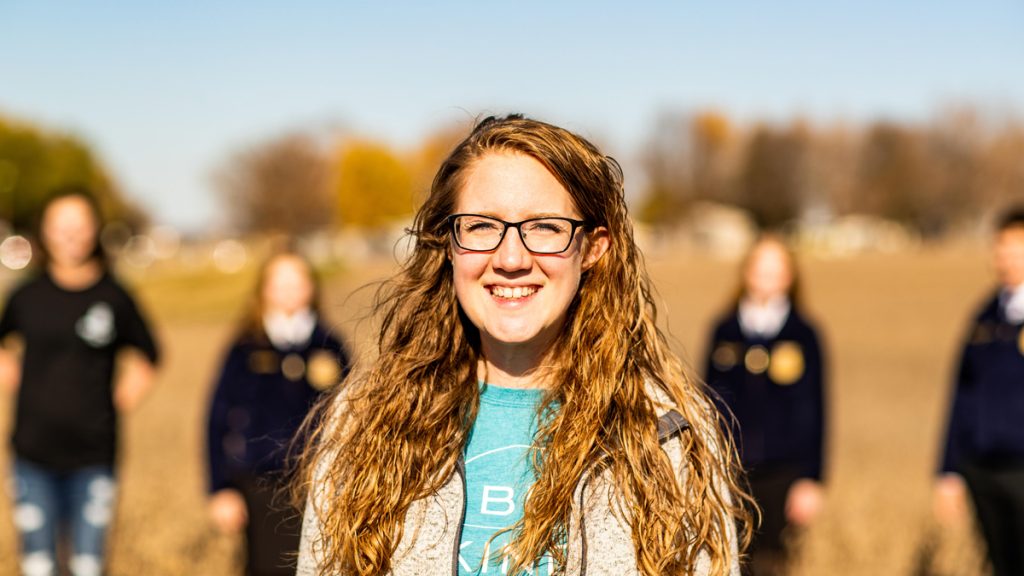
For 75 years, the CHS Foundation has helped develop the next generation of ag leaders for lifelong success. In honor of this milestone, the CHS Foundation will award $75,000 in grants for K-12 teachers to implement a project at their school that will engage students in experiential agricultural education.
(more…)Third quarter net income of $576.6 Million in fiscal 2022 earnings reflect continued strong global demand

CHS Inc., the nation’s leading agribusiness cooperative, today released results for its third quarter ended May 31, 2022. The company reported third quarter net income of $576.6 million and revenues of $13.1 billion, compared to third quarter fiscal year 2021 net income of $273.6 million and revenues of $10.9 billion. For the first nine months of fiscal year 2022, the company reported net income of $1.2 billion and revenues of $34.4 billion, compared to net income of $305.0 million and revenues of $28.0 billion recorded during the same period of fiscal year 2021.
(more…)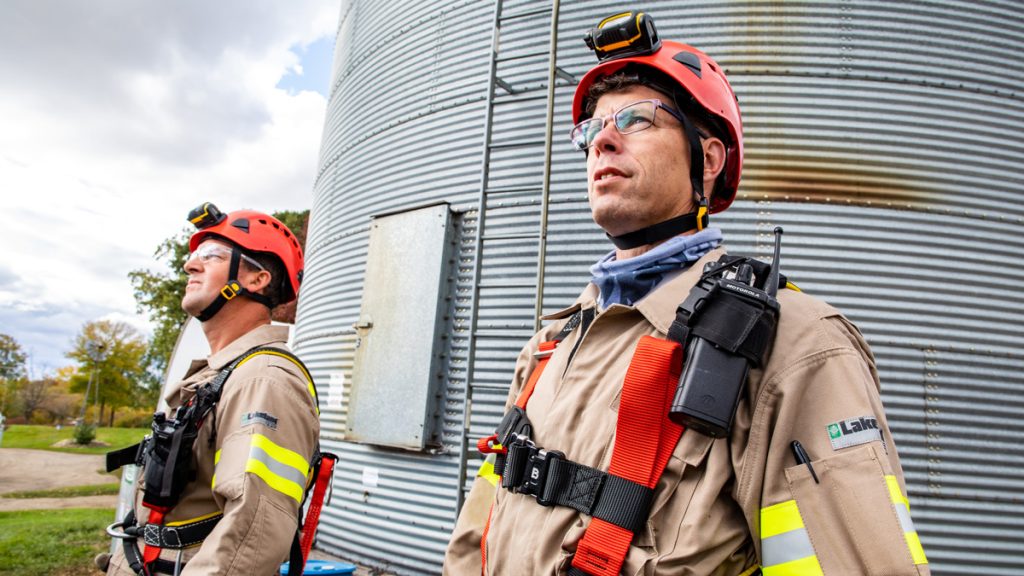
The following information is provided by Nationwide®, the #1 farm and ranch insurer in the U.S.* June is National Safety Month and we want to recognize the volunteer firefighters who keep our rural communities safe and partners like Nationwide who support them with training and resources.
Dan Neenan became a volunteer firefighter in 1991 and quickly saw something that would become a huge part of his career. First responders in small towns like his often didn’t have the training and equipment they needed to save lives on the farm.
So he set out to change that. Now more than 30 years later, Neenan embodies how and why to be a volunteer firefighter. He’s a paramedic specialist and firefighter II with the Epworth and Centralia/Peosta, Iowa, fire departments. He’s also the director of the National Educational Center for Ag Safety (NECAS) that provides valuable resources like grain bin rescue tubes to rural first responders. And through a close partnership with Nationwide, he’s been able to deliver what he saw lacking when he first started fighting fires and saving lives.
A huge part of Neenan’s work at NECAS is providing training for rural firefighters and farmers. Much of his instruction is hands-on and involves simulating some of the most hazardous working conditions and settings on and around farms.
“We develop hands-on training programs like our grain bin safety training that involves a state-of-the-art grain entrapment simulator to conduct entrapment and rescue simulations. Farmers and firefighters are alike in that they don’t want to sit and listen to somebody talk for 8 hours,” Neenan said. “They want to go out and get their hands dirty. And do something.”
In the almost 20 years since beginning these programs and simulators, Neenan said it’s not always easy to gauge his success. But with around 10,000 first responders having completed training, it’s clear he’s leading a team that’s making a big difference. And saving lives.
“From the safety side, it’s really hard to count an incident that didn’t happen,” he said. “From the rescue side, it’s a different story. Thirty-two departments have completed our grain bin safety training and have gone on to rescue someone in a bin.”
Neenan has led lifesaving efforts. But he’s quick to point out he’s no hero. To him, he’s just one member of a larger team — including Nationwide — who has made a lifesaving difference in farm towns around the country. It’s part of why he is a volunteer firefighter.
“If you look at the partnership we have with Nationwide and all the partners who have come together to donate or help make something like Grain Bin Safety Week happen, do I play a part in it? Yes. Am I the only reason? I don’t think so,” Neenan said. “It takes a team to do that. Just like a fire department.”
Visit AgInsightCenter.com for expert tips and information from Nationwide for your farm or ranch.
*A.M. Best Market Share Report 2021.
Nationwide, the Nationwide N and Eagle, and Nationwide is on your side are service marks of Nationwide Mutual Insurance Company.
© 2022 Nationwide
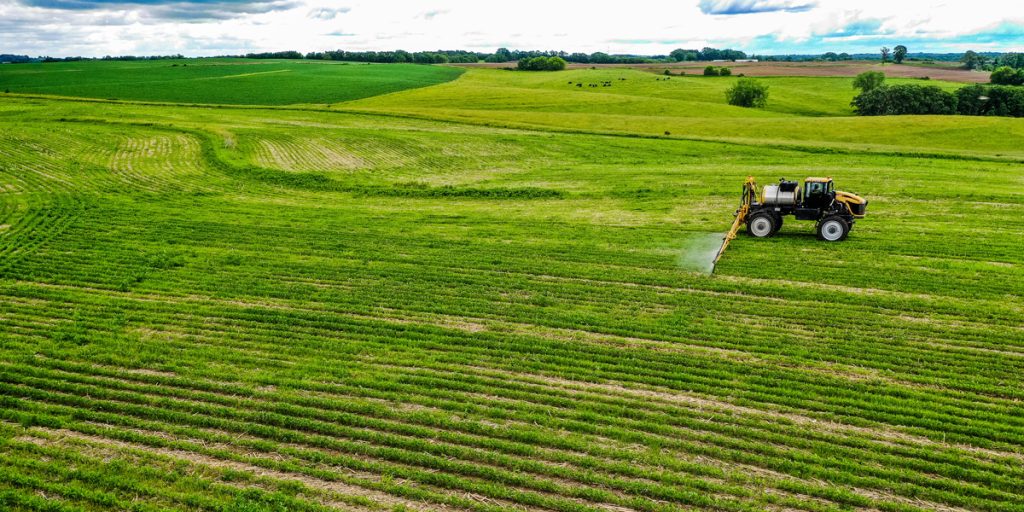
CHS monitors energy, fertilizer and grain market dynamics to help cooperatives, retailers and the farmers they serve navigate even the most challenging market conditions for the crop inputs to raise healthy, profitable crops. Check out our latest Markets in Review.
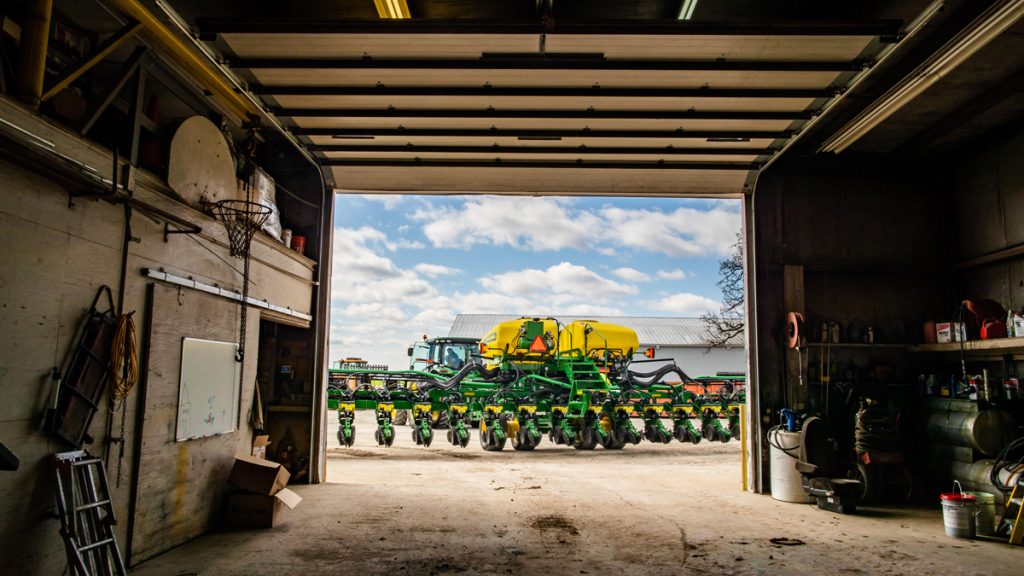
Spring is right around the corner, meaning planting will be top of mind for growers across the U.S. As the season changes, and excitement builds, it is important to remember these tips to ensure an effective and, most importantly, safe planting season.
Ensuring all equipment is clean, safe, and ready to go for planting is an important first step. Before using any equipment, a safety check should be performed, and all technology updated.
Safety and equipment checks should include:
Conducting these checks helps to prevent unnecessary delays due to malfunctioning equipment or technology.
There is a reason companies regularly repeat the phrase, “Always read and follow the label’s instructions.” Applying products like herbicides, insecticides, fungicides, seed treatments and fertilizer incorrectly, or using an expired product, can have harmful effects not only on your crops but on your health. Before applying or handling a product, always check the label and follow it exactly.
Before applying or handling any chemicals, it is important to check to be sure proper PPE is available, well fitted and functions properly. Do not overlook cautionary statements. Always protect your skin, eyes and lungs with proper PPE which may include long sleeves, gloves, masks and eyewear. Always have first aid available in case of accidents.
Planting can be a stressful and hectic time, so it is important to ensure your body is being taken care of. While it is important to get the crop planted in a timely fashion, not getting enough sleep or eating good food can have a long-term impact on health. During planting, make sure to prioritize quality sleep and eat healthy meals and snacks throughout the day.
There is no shame in asking for help. In fact, great things can come from it! Whether it is holding a flashlight to help fix a part, lifting a heavy item or confirming a confusing detail, asking for help will almost always save time in the long run. Before planting begins, determine who is available to help at planting. Make a schedule and use it to help make sure everyone knows who and where everyone is. Have important phone numbers and contacts saved and easily accessible.
It is also encouraged to check in on friends and family to see how planting is going for them and offering encouragement or identifying resources when needed. Planting can be stressful and showing support for friends and neighbors can mean a lot.
Taking time to prepare for a safe planting season and reviewing the plan early and often with your team is a great way to maximize efficiency during planting. It’s also important to note important details that happened so you can refer to them throughout the season and when preparing for the next growing season.
For more information or support for the upcoming growing season, contact your CHS agronomy sales representative.
Second quarter net income of $219.0 million in fiscal 2022 reflects strong global demand

CHS Inc., the nation’s leading agribusiness cooperative, today released results for its second quarter ended Feb. 28, 2022. The company reported second quarter net income of $219.0 million and revenues of $10.3 billion, compared to a net loss of $38.2 million and $8.3 billion in revenues for the second quarter of fiscal year 2021. For the first six months of fiscal year 2022, the company reported net income of $671.0 million and revenues of $21.2 billion, compared to net income of $31.4 million and revenues of $17.0 billion recorded in the first half of fiscal year 2021.
(more…)